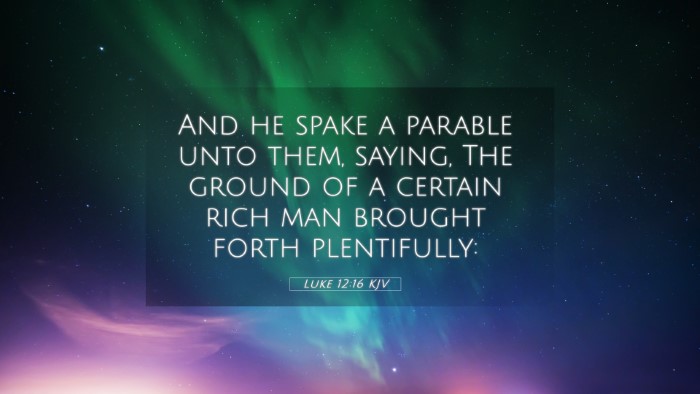Meaning and Interpretation of Luke 12:16
Luke 12:16 states: "And he spake a parable unto them, saying, The ground of a certain rich man brought forth plentifully." This verse introduces a parable that conveys significant spiritual lessons regarding material wealth, possessions, and the true essence of life.
Context and Background
In this section, Jesus is addressing the themes of greed and the misguided pursuit of material wealth. The parable serves as a direct response to the mindset of valuing possessions above spiritual richness. Jesus often used parables to reveal the kingdom of God’s principles and to challenge prevailing societal norms.
Summary of Insights from Public Domain Commentaries
Matthew Henry's Commentary
Matthew Henry explains that the man in the parable grows prosperous not by virtue but by the mere blessings of his land. His focus on self and earthly riches leads to a tragic misunderstanding of true abundance. Henry emphasizes that earthly wealth alone cannot satisfy one's spiritual needs.
Albert Barnes' Notes
Albert Barnes highlights the lesson regarding human folly in hoarding wealth. The rich man’s intention to build bigger barns for his surplus possession reflects selfishness and ignorance of life’s brevity. According to Barnes, true wisdom is found not in accumulation but in generosity and dependence on God.
Adam Clarke's Commentary
Adam Clarke interprets this verse as a warning against the folly of relying on material wealth. Clarke notes that the rich man fails to acknowledge that his life could be demanded at any moment. His predicament serves as a reminder of the eternal value of one’s soul over transient riches, urging believers to seek spiritual instead of material wealth.
Key Themes
- The Illusion of Security: Material wealth offers a false sense of security.
- Shortness of Life: Wealth can be taken at any moment; one should focus on spiritual matters.
- Focus on God: True richness comes from reliance on God, not on materialism.
- Generosity vs. Greed: The importance of sharing and being generous with what one has.
Bible Cross-References
Understanding Luke 12:16 can be deepened by examining its connections with other passages in the Bible:
- Ecclesiastes 5:10: "He who loves silver will not be satisfied with silver; nor he who loves abundance, with increase." This verse underscores the insatiable nature of greed.
- Matthew 6:19-21: "Do not lay up for yourselves treasures on earth..." Jesus teaches that spiritual wealth is far more valuable than material possessions.
- Luke 12:20: "But God said to him, 'Fool! This night your soul will be required of you; then whose will those things be which you have provided?'" This highlights the futility of amassing wealth without regard for one’s spiritual state.
- James 4:13-14: Speaks of the unpredictability of life, reinforcing the message in Luke 12:16 about life’s brevity.
- 1 Timothy 6:7-10: Discusses the dangers of the love of money and the importance of contentment.
- Proverbs 11:28: "He who trusts in his riches will fall, but the righteous will flourish like foliage." A reminder that dependence on God is vital.
- Luke 16:19-31: The parable of the rich man and Lazarus further illustrates the consequences of neglecting spiritual priorities in favor of wealth.
- Colossians 3:2: "Set your mind on things that are above, not on things that are on earth," encouraging believers to focus on eternal rather than temporal matters.
- Matthew 19:24: "Again I tell you, it is easier for a camel to go through the eye of a needle than for a rich person to enter the kingdom of God," emphasizing the challenges wealth presents to spiritual committedness.
- Luke 18:22: The call to sell possessions and distribute them to the poor is a practical application of the principle found in the parable of the rich man.
Conclusion
Luke 12:16 serves as a profound reminder to evaluate our relationship with material possessions. Through the commentary collective insights of Matthew Henry, Albert Barnes, and Adam Clarke, we learn that true wealth is not measured by what we possess but by our reliance on God and our willingness to share with others. By exploring its thematic connections with other scripture, believers can cultivate a deeper understanding that aligns with Christ’s teachings.










